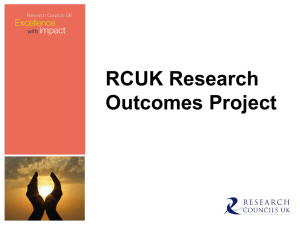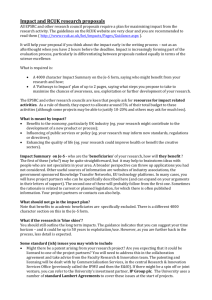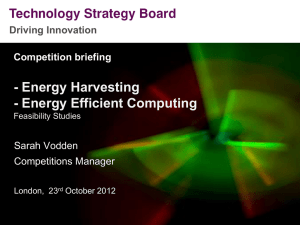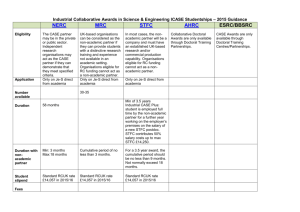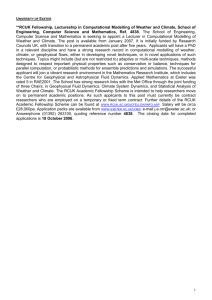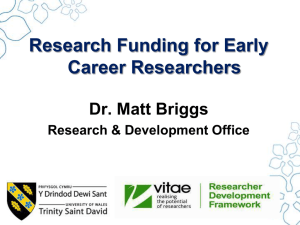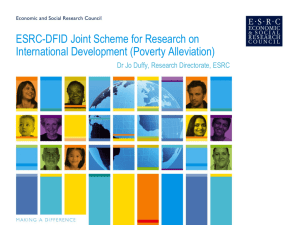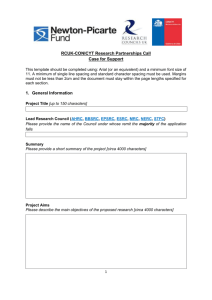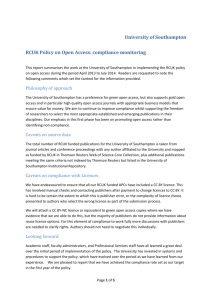Application Guidance - Research Councils UK
advertisement
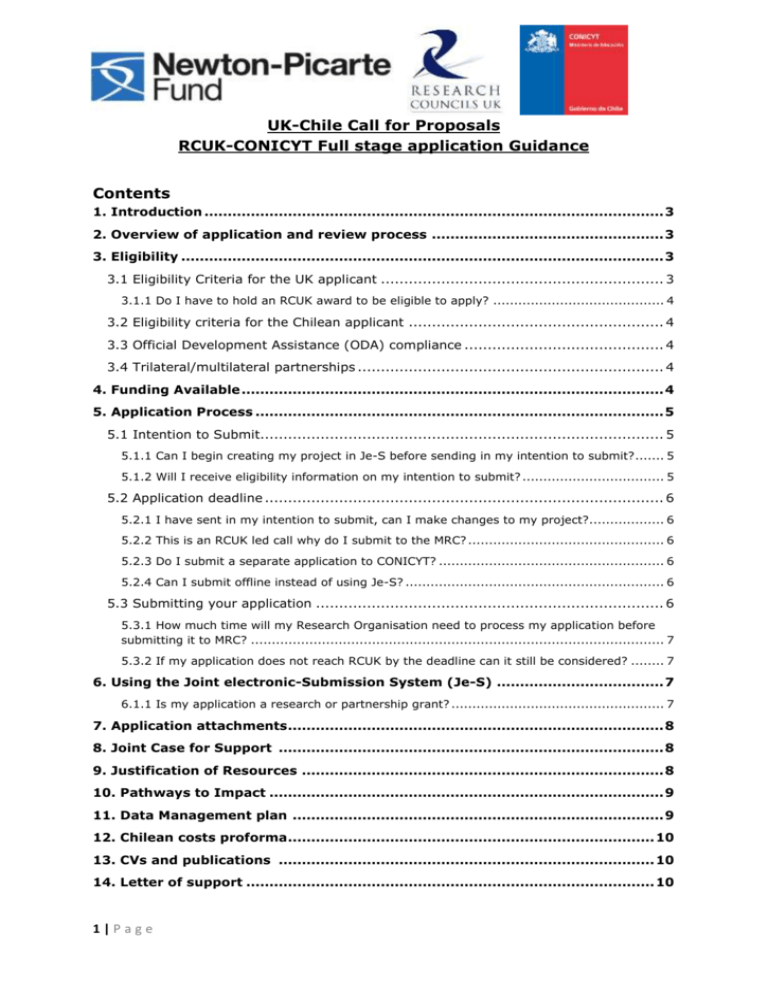
UK-Chile Call for Proposals RCUK-CONICYT Full stage application Guidance Contents 1. Introduction ................................................................................................... 3 2. Overview of application and review process .................................................. 3 3. Eligibility ........................................................................................................ 3 3.1 Eligibility Criteria for the UK applicant ............................................................. 3 3.1.1 Do I have to hold an RCUK award to be eligible to apply? ......................................... 4 3.2 Eligibility criteria for the Chilean applicant ....................................................... 4 3.3 Official Development Assistance (ODA) compliance ........................................... 4 3.4 Trilateral/multilateral partnerships .................................................................. 4 4. Funding Available ........................................................................................... 4 5. Application Process ........................................................................................ 5 5.1 Intention to Submit....................................................................................... 5 5.1.1 Can I begin creating my project in Je-S before sending in my intention to submit? ....... 5 5.1.2 Will I receive eligibility information on my intention to submit? .................................. 5 5.2 Application deadline ...................................................................................... 6 5.2.1 I have sent in my intention to submit, can I make changes to my project? .................. 6 5.2.2 This is an RCUK led call why do I submit to the MRC? ............................................... 6 5.2.3 Do I submit a separate application to CONICYT? ...................................................... 6 5.2.4 Can I submit offline instead of using Je-S? .............................................................. 6 5.3 Submitting your application ........................................................................... 6 5.3.1 How much time will my Research Organisation need to process my application before submitting it to MRC? ................................................................................................... 7 5.3.2 If my application does not reach RCUK by the deadline can it still be considered? ........ 7 6. Using the Joint electronic-Submission System (Je-S) .................................... 7 6.1.1 Is my application a research or partnership grant? ................................................... 7 7. Application attachments ................................................................................. 8 8. Joint Case for Support ................................................................................... 8 9. Justification of Resources .............................................................................. 8 10. Pathways to Impact ..................................................................................... 9 11. Data Management plan ................................................................................ 9 12. Chilean costs proforma ............................................................................... 10 13. CVs and publications ................................................................................. 10 14. Letter of support ........................................................................................ 10 1|Page 15. Summary in Spanish ................................................................................... 11 16. Human Participation letter ......................................................................... 11 17. Use of Animals letter .................................................................................. 11 18. Completing your Je-S Form ........................................................................ 12 18.1 Project details .......................................................................................... 12 18.1.1 What should my start date be in the Je-S System? ............................................... 12 18.2 Investigators ............................................................................................ 12 18.2.1 Do both Chilean and UK investigators need to be registered on the Je-S system? ..... 13 18.2.2 How do I put the UK Principal Investigator and Co-Investigators on the Je-S form? .. 13 18.2.3 How do I add the Chilean Principal Investigator and Co-Investigators to the Je-S form? ................................................................................................................................ 13 18.7 Resources ................................................................................................ 14 18.7.1 Do I include my Chilean costs on the Je-S form? .................................................. 14 18.7.2 How are grants paid? ........................................................................................ 14 18.7.3 Can I apply for publication costs? ....................................................................... 14 18.7.4 How should costs associated with travel or subsistence be allocated? ..................... 15 18.8 Project partners ........................................................................................ 15 18.9 Other support ........................................................................................... 15 18.10 Human Participation ................................................................................ 15 18.10.1 My research involving humans will take place in Chile should I still put it into the Je-S form? ....................................................................................................................... 16 18.11 Animal Research ..................................................................................... 16 18.11.1 My animal research will take place in Chile should I still put it into the Je-S form? .. 17 18.11.2 If I am using animals what information do I need to include on the Je-S form? ...... 17 18.12 Ethical Implications ................................................................................. 17 18.13 Approvals ............................................................................................... 18 18.13.1 The research requiring approvals will take place in Chile, do I need to seek UK approval? .................................................................................................................. 18 18.13.2 Do you require the approvals to make funding decisions? .................................... 18 18.13 Proposal classifications ............................................................................ 18 19. Assessment Process and Criteria ................................................................ 18 19.1.1 Can I nominate reviewers for my application? ...................................................... 18 19.1.2 Will I have an opportunity to respond to assessor comments? ............................... 19 20. Post Award ................................................................................................. 19 20.1.1 My application is not within MRC remit what do I do if I get awarded? .................... 19 20.1.2 My application is within MRC remit what do I do if I get awarded? .......................... 19 21. Contact information ................................................................................... 19 2|Page 1. Introduction This initiative will provide funding for high-quality collaborative research projects between UK and Chilean researchers which contribute to the economic development and welfare of Chile and to developing countries more broadly. Researchers will be responsible for developing their own collaborations and once a research proposal is developed, UK and Chilean applicants must apply jointly for funding. For administrative purposes all projects will have a Principal Investigator (PI) based at a UK Research Organisation (RO) and a Principal Investigator based at a Chilean RO. Chilean and UK partners must work together to complete one joint application to be written in English and submitted by the UK lead Research Organisation to RCUK via the MRC Joint electronic System (Je-S) https://je-s.rcuk.ac.uk/JeS2WebLoginSite/Login.aspx Important: Where information and guidance issued in this document differs from the general guidance offered in these sources; you should adhere to the guidance in this document. 2. Overview of application and review process 1. Call opens in the Je-S system Thursday, 27 August 2015; please now begin preparing your joint application in the system. 2. Joint intention to submit emailed to international@rcuk.ac.uk by 16:00 BST Thursday, 17 September 2015 (see intention to submit template) 3. Joint application from the UK and Chilean researchers must be received by 16:00 BST Thursday, 08 October 2015. All jointly prepared RCUK applications will be submitted to the Medical Research Council (who will host this call) via the Joint Electronic System (Je-S). The UK PI will submit the application on behalf of all collaborators. 4. Joint peer review process including UK and Chilean assessors will take place 5. Joint panel meetings of academic experts for RCUK and CONICYT, 30 November 2015. 6. Successful proposals withdrawn from MRC Je-S system by research offices and submitted to lead council by remit (not necessary for MRC-remit grants) 18 December 2015. 3. Eligibility 3.1 Eligibility Criteria for the UK applicant The UK Principal Investigator (PI) and Research Organisation (RO) must be eligible to apply according to the relevant Research Council’s guidance. Please identify the Council under whose remit the majority of the application falls and follow their guidance along with the RCUK terms and conditions which can be found at the following links: Research Councils UK (RCUK) Arts and Humanities Research Council (AHRC) Biotechnology and Biological Sciences Research Council (BBSRC) Engineering and Physical Sciences Research Council (EPSRC) Economic and Social Research Council (ESRC) Medical Research Council (MRC) - MRC Units and Institutes are also eligible to apply Natural Environment Research Council (NERC) Science and Technology Facilities Council (STFC) 3|Page 3.1.1 Do I have to hold an RCUK award to be eligible to apply? No. For this call you do no need to currently hold or have held an RCUK grant, but you must be eligible to apply within the relevant Research Council’s guidance, as above. 3.2 Eligibility criteria for the Chilean applicant Applicants to this call should be researchers residing in Chile, with experience in the areas of the call, who are sponsored by one or more Chilean public or private non-profit institutions, dedicated to scientific research and the development of the areas of this call. Please refer to the call text (“Bases Convocatoria 2015” available on www.conicyt.cl/pci) issued by CONICYT for the individual eligibility criteria. For eligibility queries please contact Sebastián Flores del Castillo, sflores@conicyt.cl 3.3 Official Development Assistance (ODA) compliance The Newton Fund forms part of the UK’s Official Development Assistance (ODA) commitment which is monitored by the Organisation for Economic Cooperation and Development (OECD). ODA funded activity focuses on outcomes that promote the longterm sustainable growth of countries on the OECD Development Assistance Committee. Newton Fund countries represent a sub-set of this list. The Fund requires that the funding be awarded in a manner that fits with Official Development Assistance (ODA) guidelines. All applications under this call must therefore be compliant with these guidelines. http://www.newtonfund.ac.uk/about/what-is-oda/ Whilst still currently on the OECD DAC list, Chile may graduate from the list in the next few years and, as a result, and a condition of the Newton Fund, proposals must contribute towards the economic development and welfare of Chile and articulate a broader applicability to lower income countries globally. For more information on ODA please refer to the RCUK Newton Fund Guidance. 3.4 Trilateral/multilateral partnerships The initiative is aimed at developing UK-Chile research partnerships. Funds cannot be used to cover the costs of participation of other countries. However the involvement of other countries will be considered if a strong strategic need is articulated in the proposal and it is made clear the ‘other’ partners have funding to support their involvement in the partnership. Please ensure you contact international@rcuk.ac.uk if you plan to include another partner. 4. Funding Available The RCUK has allocated up to £2.5 million and CONICYT has allocated approximately £1.34 million to this activity; we expect to fund around 10, 2-3 year research projects through this joint call. RCUK funding will support the UK component of the partnership and CONICYT funding will support the Chile component. RCUK-funded costs of each project will be provided via a grant issued and managed by the relevant Research Council, according to the remit of the research proposal, in accordance with their normal research funding guidelines and procedures. CONICYT-funded costs of each project will be provided via a grant issued and managed by CONICYT in accordance with its normal guidelines. Please refer to the Chilean call text available at www.conicyt.cl/pci. 4|Page Please see below for reference a table of costs that will be covered by RCUK and CONICYT funding. RCUK funding CONICYT funding Staff – directly incurred post Yes Yes Staff – directly allocated posts (PI and Co-I time) Yes No, PI and Co-I salaries are expected to be covered by other sources Other research costs (including equipment, consumables) Yes Yes Studentships (PhD) No No Travel and subsistence for exchange/mobility activities Yes Yes Cost of workshops, meetings etc. Yes Yes Estates and indirect costs Yes No Exceptions Only in exceptional circumstances, please contact international@rcuk.ac.uk No Research costs: 5. Application Process 5.1 Intention to Submit To identify and convene assessment panels in advance, it is important that researchers indicate their intention to submit a proposal. Please email an intention to submit to international@rcuk.ac.uk by 16:00 BST 17 September 2015. Please see link to the ‘intention to submit’ template on the call webpage. 5.1.1 Can I begin creating my project in Je-S before sending in my intention to submit? It is advised that you begin creating your project in the Je-S system as soon as possible. This will ensure that you have enough time for the proposal to go through your research office before final submission. It is envisioned that the intention to submit and Je-S application form would be completed in conjunction with each other. 5.1.2 Will I receive eligibility information on my intention to submit? No, your submission will only be acknowledged by RCUK. This form is not intended to assess or comment on the eligibility of a proposal, applicant or research office and should not affect or delay the creation and completion of your proposal on the Je-S system. 5|Page 5.2 Application deadline The deadline for applications is 16:00 BST, Thursday 08 October 2015. Applications to this RCUK led call will be made through the Medical Research Council (MRC) who are hosting this call on behalf of all seven Research Councils and CONICYT. All applications to the MRC must be made through the RCUK Joint electronic-Submissions system (Je-S). The URL for the Je-S application system is: https://je-s.rcuk.ac.uk/ 5.2.1 I have sent in my intention to submit, can I make changes to my project? Yes, changes can be made to your project after returning your intention to submit. Please note: you do not need to notify RCUK to change your project. 5.2.2 This is an RCUK led call why do I submit to the MRC? Applications to this RCUK led call will be hosted by the MRC so all submissions must go to the MRC, regardless of remit. Applicants must identify within their Case for Support the actual Council they would apply to in terms of remit. 5.2.3 Do I submit a separate application to CONICYT? No. the application process is hosted by the MRC on behalf of RCUK and CONICYT. After the application deadline RCUK will share the applications submitted with CONICYT. 5.2.4 Can I submit offline instead of using Je-S? No. All applications must be submitted via the Je-S system. Proposals submitted by email will not be accepted for processing. 5.3 Submitting your application To submit your proposal the UK Research Organisation must be registered for Je-S, and the applicants must hold Je-S accounts. Further information and guidance is available on the Je-S Help Pages. After all mandatory sections of your proposal have been completed, the submit button will appear across the top menu bar. Please ensure that you have completed all attachments that are not standard mandatory attachments for Je-S but are a mandatory requirement to be completed for this specific call. The submit button will route your finalised proposal to the authorising facility within your research organisation. Please note this further layer of administration between your submission of the proposal and the proposal being submitted to the MRC (on behalf of RCUK), via Je-S. The Research Organisation's submission route usually includes both an approver (ie head of department) and submitter pool (ie central finance office). Please allow sufficient time for completion of the research organisation’s submission checks and authorisation. The Research Councils cannot accept responsibility for any delay which may occur as a consequence. We strongly advise applicants to secure confirmation from their relevant administrator that the proposal has been successfully submitted to the MRC in good time before the call closes. Once submitted, there are document maintenance actions that can be undertaken via the Document actions button. For example, the ‘Show submission path’ will indicate to you where in the organisation submission chain the proposal currently is located (and who holds current responsibility) - eg owner, approval pool, submitter pool or submitted to Council. 6|Page 5.3.1 How much time will my Research Organisation need to process my application before submitting it to MRC? This will depend on your Research Organisation, please contact your research office to confirm. 5.3.2 If my application does not reach RCUK by the deadline can it still be considered? No. Applications not submitted by 16:00 BST on the 08 October 2015 will not be considered for funding. 6. Using the Joint electronic-Submission System (Je-S) Please log in to your Je-S account via https://jes.rcuk.ac.uk/JeS2WebLoginSite/Logout.aspx, using the username and password you have chosen (if you do not have a Je-S account, or have forgotten your password, please see the guidance provided further below). Select ‘Documents’ from left hand menu list from your Je-S account home page Select ‘New Document’ from within the Functions/create section of your documents page Creating your Je-S application: Please note, the call, RCUK Newton– CONICYT (Chile) Research Partnerships Call 2015 can only be selected when the call opening date 27 August 2015, has been reached. This RCUK funding call closes at 16:00 BST, on the 08 October 2015. Select Council: MRC (MRC are hosting this call on behalf of RCUK and CONICYT – all applications regardless of remit must be submitted through the MRC) Select Document Type: Standard Proposal Select Scheme: Newton Fund Select Call/Type/Mode: RCUK Newton– CONICYT (Chile) Research Partnerships Call 2015 Select ‘Create Document’ option New Je-S Users: In order to gain access to the Je-S System, please Create an Account. Je-S users having problems successfully completing login to their Je-S account: Retrieve User Name / Password. Please telephone Je-S Helpdesk 01793 444164 should you require any assistance with the Je-S System. It is the applicant’s responsibility to ensure that the proposal is created and submitted against the correct call (and consequently correct scheme). We will not accept proposals for processing that are not submitted using the above call route. 6.1.1 Is my application a research or partnership grant? Although your grant does promote partnership between UK and Chile it is primarily a research grant and MUST be listed as such throughout your project. 7|Page 7. Application attachments It is important that applicants only submit the supporting attachments specified in this document. It is recommended that attachments are uploaded in PDF (rather than Word) format, to ensure unsupported font type issues do not cause problems with maximum length requirements, please see Je-S guidance; https://jes.rcuk.ac.uk/Handbook/pages/SystemRequirementsFormatsandSa/SystemRequirements FormatsandSa.htm The following are mandatory Je-S attachments for this call: 8. 9. 10. 11. 12. 13. 14. 15. Joint Case for Support (please complete the template) Justification of Resources (please complete the template) Pathways to Impact (two A4 pages max) Data Management Plan (three A4 pages max) Chilean costs proforma (please complete the template) CVs and publications (three A4 pages max for each investigator UK and Chilean) Letters of support (two A4 pages max) Summary in Spanish (one A4 page max) If you project includes human participation please also include: 16. Human Participation letter (two A4 pages max) 17. Use of Animals letter (two A4 pages max) Optional Proposal Cover Letter (two A4 pages max) Important note: If you are unclear about whether you can include a specific attachment please contact international@rcuk.ac.uk for advice, as unrequested attachments can hinder the processing of your application. The Research Councils reserve the right to return or reject applications that include attachments not permitted on this call. 8. Joint Case for Support (please complete the template) This is the body of your research proposal; applicants must complete the Case for Support template and attach it as a “Case for Support” document. The page lengths must not be exceeded for each section and must be in a minimum font size of Arial, 11 point, with margins of at least 2cm. 9. Justification of Resources (please complete the template) A four page A4 statement, (two pages per country) written in a minimum font size of Arial, 11 point, with margins of at least 2 cm, justifying that the resources requested are appropriate to undertake the research project. You must complete one Justification of Resources (JOR) document; justifying both the UK costs and Chilean costs and attach it to your application under “Justification of Resources”. The JOR must contain a breakdown of the costs requested for this funding scheme by each partner taking into account the requirements outlined under the Funding Available section of this document. The JOR should explain why the resources requested are appropriate for the research proposed, taking into account the nature and complexity of the research proposal. It should not be simply a list of the resources required, as this is already given in the Je-S form and the Chilean costs proforma. Where you do not provide explanation for an item that requires justification, it may be cut from any grant made. 8|Page Please refer to the joint Research Council Je-S helptext https://jes.rcuk.ac.uk/Handbook/index.htm#pages/JeSHelpdesk.htm further guidance. 10. Pathways to Impact (maximum of two sides of A4) While the Impact Summary section of the Je-S form is for applicants to explain who will benefit from the research and how, the Pathways to Impact attachment should be used to explain what will be undertaken by the applicant to ensure that opportunities for users to benefit from your research, and thus for achieving economic and societal impact, are maximised. The Pathways to Impact is your opportunity to describe how the potential impacts of your research will be realised. This attachment is specific to users and beneficiaries of the research who are outside of the academic research community including, for instance, the public sector, private sector, civil society or the wider public in general. User communities for Research Council research may include bodies and individuals from industry, charities, universities, local authorities and other public bodies, government departments and independent policy bodies. Potential academic beneficiaries of your work and pathways towards achieving academic impact should not be detailed in this attachment but in the ‘Academic Beneficiaries’ section of the Je-S form and the ‘Case for Support’ as appropriate. In describing plans to maximise impact, applicants should consider what is achievable and expected for research of this nature. If you do not feel that your research has potential to achieve impact outside of academia, you should use the Pathways to Impact attachment to explain why this is the case. However, it is expected that applicants will have considered impact in its broadest economic and societal terms before coming to this conclusion. Applicants should note that while we recognise the value of this type of research, reviewers may comment on the applicant’s reasoning during consideration of the proposal. Impact can take many forms, manifest at different stages in the research process, and be promoted in different ways. It may be helpful to consider impact in respect of the short term (during the currency of the grant), medium term (up to one year afterwards), and the long term. Please detail how the proposed research project will be managed to engage users and beneficiaries and increase the likelihood of impacts. 11. Data Management plan (maximum of three sides of A4) All applicants submitting a proposal to a Newton Funded scheme MUST include a Data Management Plan as an attachment to their JeS application. Please describe how the transnational project will be managed with emphasis on communication strategies, data management and data sharing across the project and management of intellectual property. Please describe potential routes to translate the outcomes from the project into genuine impacts that benefit Developing Countries. Any additional impacts that benefit the UK and Chile should also be noted. Include interaction with private sector, policy makers and other relevant stakeholders This statement must clearly detail how you will comply with the Research Councils’ Common Principles on Data Policy, including concise plans for data management and 9|Page sharing as part of research grant proposal, or provide explicit reasons why data sharing is not possible or appropriate. Data sharing plans may include details of: Data areas and data types - the volume, type and content of data that will be generated e.g. experimental measurements, records and images; Standards and metadata - the standards and methodologies that will be adopted for data collection and management, and why these have been selected; Relationship to other data available in public repositories; Secondary use - further intended and/or foreseeable research uses for the completed dataset(s); Methods for data sharing - planned mechanisms for making these data available, e.g. through deposition in existing public databases or on request, including access mechanisms where appropriate; Proprietary data - any restrictions on data sharing due to the need to protect proprietary or patentable data; Timeframes - timescales for public release of data; Format of the final dataset. Applicants may claim justifiable costs associated with data sharing activities, which should be captured in the application proforma and in Justification of Resources statement. Please note that preliminary data and descriptions of the proposed work belong in the Case for Support and should not be included in the data sharing statement. 12. Chilean costs proforma Please complete the Chilean costs proforma template, please ensure you complete all tabs in the spreadsheet. Please note, overhead and indirect costs will not be funded for Chilean organisations. Principal and Co-Investigator salaries should also not be costed and are expected to be covered by other sources. 13. CVs and publications (maximum of three sides of A4 per applicant) A CV for each Principal Investigator and Co-Investigator must be included. This should include contact details, qualifications (including class and subject), academic and professional posts held since graduation, a list of the most relevant and recent publications, and a record of research funded by the Research Councils and other bodies. This should not exceed three A4 sides. It is expected you would use two pages for the CV and one page for publications. 14. Letter of support (maximum of two sides of A4 per applicant) Please include letters of support for the following: From the UK institutions involved in the project. From the Chilean institutions involved in the project, please complete the Chilean Institution Letter of Support Template. Organisations entered on the Je-S form as ‘Project Partners’. A Project Partner is an organisation which contributes in cash or in kind to the project but which is not requesting any money. Any projects that include human participation. Please refer to 16.Human Participation letter. 10 | P a g e Any projects that include human participation. Please refer to 17. Use of Animals letter. 15. Summary in Spanish (maximum of one side of A4) Please provide an application summary translated into Spanish. This can be the same as the Je-S summary but must be written in Spanish. 16. Human Participation letter If your research involves human participation you must include a signed letter of support which should be titled ‘Human Participation’ and uploaded under “Letters of Support”. Including the following: Where the recruitment of the participants/ human tissue will take place and the appropriate agreements. That what is being supplied is suitable for the research being undertaken. That the quantity of tissue (where relevant) being supplied is suitable, but not excessive for achieving meaningful results. That the proposed research will be carried out to a high ethical standard and clearly state how any potential ethical and health and safety issues have been considered and will be addressed. The approvals that will be sought/ have been sought in the UK and Chile and what will be in place ahead of starting the grant. The letter of support must be an integral part of the application (as an attachment) and must focus on the proposal it accompanies. 17. Use of Animals letter Investigators proposing to the use of animals must include a signed letter of support which should be titled ‘Use of Animals’ and uploaded under “Letters of Support”. The use of animal’s letter must include the following: A signed statement that: o They will adhere to all relevant national and local regulatory systems in the UK and Chile. o They will follow the guidelines laid out in the Responsibility in the use of animals in bioscience research document and ensure that work is carried out to UK standards. o Before initiation of the proposed research work, appropriate approvals from Institutional and/or central animal ethics committees will be obtained for experimental protocols to be adopted in their projects. Successful proposals may be expected to provide copies of these permissions before funding is released. • Details on where the animal research will take place (UK or overseas) and through which funder the resources are being sought. Applicants should include confirmation that animal welfare standards at these institutions meet the requirements outlined above. • Applicants should detail in the letter any additional information which was not included in the proposal document but which is pertinent to the animal research proposed and which the funders should be aware of. 11 | P a g e In addition, researchers should be reminded that sufficient information and justification regarding any animal research proposed, regardless of country, must be provided in the proposal in order to allow full peer review to take place. 18. Completing your Je-S Form Please complete the full Je-S form. The initial Je-S document instructions page will give you general guidance on the navigation layout, specifically icon descriptions. The left hand column ‘Document Menu’ lists all the sections associated with this call and clearly identifies which ones are mandatory (red cross, turning to green tick when completed). The details below are not an exhaustive step-by-step guidance, and we recommend that you refer to the Je-S helptext for additional information. Please note you may return to edit saved documents at any time. 18.1 Project details Select organisation and department from drop down lists ‘Your Reference’ should be supplied by your research organisation (consult your Research Office). If your administration office does not have a system for referencing grant proposals, a suitable reference of your own choice will be acceptable. Use "Your reference" to help distinguish easily between proposals in users’ Current Documents lists. The reference is intended to be a unique identifier for the proposal, and is unrelated to the reference that the organisation would be asked to provide if a grant were awarded. Enter ‘Project Title’ (maximum limit of 150 characters) For ‘Proposal Call’, select RCUK Newton– CONICYT (Chile) Research Partnerships Call 2015. Please note that the option will only be available once the call is live, 27 August 2015. Your start date should be before 01 February 2016. Your grant should be a proposed duration of no more than 34 months. 18.1.1 What should my start date be in the Je-S System? As stated in the call text, due to the tight timescales and funding restrictions of the Newton Fund, the proposed start date on the Je-S system must be before 01 February 2016; the grant must end by December 2018. Please note that in order to start the grant the start confirmation must be submitted by 01 February 2016 (shorter than the standard 42 days for Research Council grants). Please refer to http://www.rcuk.ac.uk/RCUKprod/assets/documents/documents/tcfecJan2015.pdf for information on what the starting procedure entails; please ensure that you inform the relevant support staff in your organisation of this requirement to ensure the project starts on time. 18.2 Investigators Enter the name of the Principal Investigator (PI) and any Co-Investigators (Co-Is). Investigators may be from more than one Research Organisation but the UK PI must be from the Organisation that will administer the UK side of the grant. The PI will take intellectual leadership of the project and manage the research; this individual will be the contact person for Research Council correspondence. All named investigators are responsible for ensuring that successful proposals are undertaken and completed in the manner specified. Please note that it is mandatory that you answer positively to the question ‘Post will outlast project?’ To clarify, there is an expectation that the PI’s post will be in place for the duration of the project. 12 | P a g e 18.2.1 Do both Chilean and UK investigators need to be registered on the Je-S system? Yes. For any submission through the UK Research Council online submission system, ALL named investigators (Principal Investigator and all CoInvestigators) must be registered users. For this initiative, that includes all named UK and Chilean investigators. Easy instructions to register are available here. For help with using Je-S please contact the Je-S helpdesk: Email: JeSHelp@rcuk.ac.uk Phone: +44 (0)1793 444164 Je-S website: https://je-s.rcuk.ac.uk/JeS2WebLoginSite/Login.aspx 18.2.2 How do I put the UK Principal Investigator and Co-Investigators on the Je-S form? Please input the UK PI under the Principal Investigator and the Co-Investigators under Co-Investigator as normal, unlike with the Chilean Co-I’s you will also need to record all the costs, including the number of hours. 18.2.3 How do I add the Chilean Principal Investigator and CoInvestigators to the Je-S form? The Je-S form only allows there to be one Principal Investigator on a grant. Although in reality grants under this call their will be two PI’s: one from the UK and one from Chile. For the purposes of completing the Je-S form, please enter the UK PI on to the system as the PI. Please add the Chilean PI on to the Je-S form as a Co-Investigator, as well as any other UK or Chilean Co-Investigators. Please add all Chilean Co-Investigators on to the form as below: From the document menu select Co-Investigator option. Select Add New Co-Investigator Item a) Choose the Select option (Je-S Person Search pop-up window appears). Search for and select the Co-Investigator from the search results. Please note: Uncheck the tick box so you search for people outside of the lead organisation. b) Select Yes option c) Select ‘No’ as the person will not be an MRC/ESS Staff Member. d) Indicate the total number of hours the Chilean Co-Investigator will be working on the project. Please note; must be a minimum of 1. e) Cost Type (defaults to Directly Allocated), leave as DA. f) Indicate 1 as the salary rate. Please note if the Co-I wishes to indicate their annual salary then this should be converted to sterling. g) Contracted Hours per week E.G. if the Co-I’s overseas institution contract is fulltime then they should indicate 100. If they have a part-time contract at 13 | P a g e their RO, please indicate the appropriate % depending on their actual contract. h) Number of hours charged should be 0 (zero). i) Select the calculate button (cost estimate will be 0). All the costs associated with the Chilean PI and Co-Is will be recorded on the Chilean costs proforma. j) Select the ‘Save’ to save the information. Section should then validate (green tick instead of red circle with cross). 18.7 Resources All resources requested for both Chile and the UK must be fully justified in the Justification for Resources. Within the Je-S form, please enter the costs to be incurred by the UK Research Organisation and NOT those to be incurred by the Chilean Research Organisation. RCUK will provide up to £2.5m funding with an overall limit, of approximately £250k per grant on the UK side. If successful, the UK Research Councils will meet 80 per cent of the full economic costs on proposals submitted and the host institution is expected to support the remaining 20 per cent. 18.7.1 Do I include my Chilean costs on the Je-S form? No. These costs must be included within your Chilean costs proforma, please look at Chilean costs proforma for more information on the costs that can be included. The UK and Chilean costs must also be fully justified within your Justification of Resources. 18.7.2 How are grants paid? UK Research Councils will pay the UK component of the award directly to the lead UK Organisation, which where necessary will be responsible for disbursing the funds to other UK Co-Investigators. CONICYT will pay the approved projects according to their regular procedure. 18.7.3 Can I apply for publication costs? Publication costs are no longer awarded and should not form part of your application. This is in line with RCUK terms and conditions. These costs are available from your Research Organisation via the block grant they receive for Publication costs. Staff costs If your project requires staff other than the team of investigators, their details should be entered here. ‘Directly Allocated staff’ are those who will be working directly on the project, but whose involvement on the grant can only be based on an estimate of the time the work will take (e.g. investigators). ‘Directly Incurred staff’ are those whose time on the project is actual, auditable and verifiable (e.g. researchers and technicians). Please note: Time allocation for Chilean Co-Is must be entered under ‘Directly Allocated Staff’ but the salary rate should be entered as zero. Please see 18.2.3 How do I add the Chilean Principal Investigator and Co-Investigators to the Je-S form? for more information. Travel and Subsistence costs Add each item of Travel and Subsistence required for your project. You should indicate the calculations upon which this figure is based in the ‘Destination and Purpose’ box. 14 | P a g e 18.7.4 How should costs associated with travel or subsistence be allocated? There are no specific rules regarding travel and subsistence costing’s for proposals. In international collaborations there is a precedent for the country sending a researcher to pay for the airfare and the country hosting to pay for accommodation, but there is no specific requirement. As with all costs, a clear explanation will be necessary to justify all travel and associated costs. Equipment costs Please enter any items of equipment costing £10,000 or more (including VAT) in this section. The actual level of funding sought from the Research Councils should also be entered in this section. Please refer to the help text for more information. Other directly incurred costs Including specified consumables, consultancy fees, equipment costing less than £10,000, recruitment and advertising costs to be incurred by the UK Research Organisation. Other directly allocated costs Including support staff salaries, a share of the costs of departmental support staff and the costs of access to major research facilities. Estates and indirect costs Estate and indirect costs are specific to each research organisation, and do not require justification in your Case for Support. Research organisations that have implemented the TRAC costing methodology and have passed the Quality Assurance process should apply their own estate and indirect costs. Non-research organisations that are not required to implement TRAC must have a robust costing methodology in place that has been validated in order to apply their own estates and indirect cost rates. The standard default rates should be used where research organisations have not yet developed their own rates. Your Research Office will be able to assist with this section. Exception costs Exceptional costs are not expected within this call. If applicants feel it is essential they should discuss any exceptional cost by emailing international@rcuk.ac.uk in the first instance, explaining the cost and why it is essential to the success of the proposal. 18.8 Project partners If you have secured a commitment from another organisation or funding body (other than the country partner) to provide additional resources for this project, the details of that support should be entered here. A letter of support from each partner organisation confirming the level of support specific to this proposal must be included as an attachment via this section. 18.9 Other support Enter details of any support sought or received from any other source for this or other research in the same field in the past three years. Complete all fields for support either received or pending a decision. Contributions from project partners should not be entered here - they should be detailed in the project partners section. 18.10 Human Participation The Research Organisation is responsible for managing and monitoring the conduct of medical and health research in a manner consistent with the Department of Health's Research Governance Framework for Health and Social Care. There must be effective and verifiable systems in place for managing research quality, progress and the safety 15 | P a g e and well-being of patients and other research participants. These systems must promote and maintain the relevant codes of practice and all relevant statutory review, authorisation and reporting requirements. Guidance by the MRC on the conduct of medical research, and by ESRC on the conduct of social science research, provided on behalf of all Research Councils, must be observed. In particular, for research involving humans to take place overseas is that for research to be undertaken internationally, both local and UK ethical approval is required. All research involving human participants must be undertaken in accordance with relevant policies and guidance and recorded on the Je-S form. Researchers should ensure equivalent up-to-date information relevant to ethical and legislative requirements in Chile is determined and addressed in any application. For clinical studies involving human participants and/or patients in the UK or overseas, appropriate consent must be obtained. Significant developments must be assessed as the research proceeds, especially those that affect safety and well-being, which should be reported to the appropriate authorities and to the Research Council. The Research Organisation must take appropriate and timely action when significant problems are identified. This may include temporarily suspending or terminating the research. Where there is recruitment of people as research participants and/or providing human tissue, details should be included in the Case for Support and a letter of support MUST be attached to the application. Please refer to human participation letter for more information on what to include. 18.10.1 My research involving humans will take place in Chile should I still put it into the Je-S form? Yes, whether the research involving humans is taking place in the UK or Chile it needs to be captured in the Je-S form. 18.11 Animal Research Applicants are expected to have developed their proposals in accordance with the cross funder guidance for the use of animals in research Responsibility in the Use of Animals in Bioscience Research and NC3Rs Guidelines: Primate Accommodation, Care and Use. Experiments using animals funded by the Research Councils must comply with the Animals (Scientific Procedures) Act 1986 (ASPA), amended 2012 and any further embodiments, in: • using the simplest possible, or least sentient, species of animal appropriate; • ensuring that distress and pain are avoided wherever possible; • employing an appropriate design and using the minimum number of animals consistent with ensuring that scientific objectives will be met. Advice on opportunities and techniques for implementing these principles can be found on the NC3Rs website: www.nc3rs.org.uk In particular, UK Institutions should be aware of the following aspect of the guidance relating to research or collaboration outside the UK: “When collaborating with other laboratories, or where animal facilities are provided by third parties, researchers and the local ethics committee in the UK should satisfy themselves that welfare standards consistent with the principles of UK legislation (e.g. the Animals (Scientific Procedures) Act 1986), and set out in this guidance, are applied 16 | P a g e and maintained. Where there are significant deviations, prior approval from the funding body should be sought and agreed. Where there are significant deviations, prior approval from the funding body should be sought and agreed. International research should also be compliant with all relevant national and local regulatory systems in the host country where the research is to be conducted.” Responsibility in the Use of Animals in Bioscience Research 18.11.1 My animal research will take place in Chile should I still put it into the Je-S form? Yes, whether the animal research is taking place in the UK or Chile it needs to be captured in the Je-S form. You must also include a signed letter of support, please see 17. Use of animals letter for more information. 18.11.2 If I am using animals what information do I need to include on the Je-S form? Please ensure that if you are using animals you select the appropriate species and keep in mind the following. The animal species section must be completed irrespective of whether funding for the animals is requested as part of the proposal. Researchers must provide well justified information in their applications concerning the experimental design and its suitability to answering the research questions posed. While RCUK recognises that there are ethical imperatives to reduce the number of animals used, it is also unethical to conduct a study that because of its limited size has inadequate statistical power to robustly answer a research question. Applicants should therefore provide adequate justification for their choice of design and numbers of animals and interventions. It is important that adequate information is given concerning methodological issues. Planned procedures to minimise experimental bias (for example, randomisation protocols, blinding) should be outlined or an explanation included as to why such procedures are not appropriate. Each experiment does not need to be described in detail, but sufficient information must be included that reviewers are readily able to understand the experimental plan. The scientific rationale for the experimental design should be explained in the Case for Support. Researchers must provide a properly constructed justification of how the numbers of animals to be used were determined. In general it would be expected that professional statistical advice will be sought in putting this section together. In many instances this section will include statistical power calculations based on justifiable and explicit assumptions about the anticipated size of the experimental effects. If statistical power calculations are not given, applicants should provide a principled explanation of the choice of numbers. In general, explanations based solely in terms of ‘usual practice’ will not be considered adequate. An overview of the planned statistical analyses and their relation to the choice of sample size should be included. 18.12 Ethical Implications Ethical issues should be interpreted broadly and may encompass, among other things, relevant codes of practice, the involvement of human participants, tissue or data in research, the use of animals, research that may result in damage to the environment and the use of sensitive economic, social or personal data. 17 | P a g e 18.13 Approvals The Research Organisation is responsible for ensuring that ethical issues relating to the research project are identified and brought to the attention of the relevant approval or regulatory body within the UK and Chile. Approval to undertake the research must be granted before any work requiring approval begins. Please indicate all approvals sought, whether in the UK or Chile, if it is none of those listed below, please put the information into the other bodies section. Successful proposals may be expected to provide copies of these permissions before funding is released. 18.13.1 The research requiring approvals will take place in Chile, do I need to seek UK approval? Yes, you must seek approval within the UK even if your research will take place in another Country, please indicate the approvals you have sought/will seek within your application. 18.13.2 Do you require the approvals to make funding decisions? We do not require the approvals for making a funding decision but they must be in place before the project can start. 18.13 Proposal classifications You should populate the Research Area/Qualifiers/Keyword sections to provide a comprehensive description of the research areas covered in the application. The Proposal classification area is a harmonised (and expanded) structure agreed with other Research Councils. Therefore, if your area of expertise crosses the remits of more than one Research Council you will now only need to provide the information once. 19. Assessment Process and Criteria Following submission, applications will be assessed and reviewed by experienced panel members who will be asked to assess proposals against the following criteria and weighting: Assessment Criteria Weighting Research merit of the proposal Relevance of the proposal to the strategic objectives of the Newton Picarte Fund – including potential benefits and impact Strength and appropriateness of proposed partnership and collaboration Project management structure and resources, including value for money 60% 20% 10% 10% Applications received and comments from all experts will be assessed by the joint RCUKCONICYT Review Panel on 30 November 2015. This panel will consist of academic experts from both UK and the Chile, where final decisions will be made. 19.1.1 Can I nominate reviewers for my application? Yes, although we cannot guarantee that these reviewers will be used on the panel assessing your application. If you would like to nominate reviewers for your application please include a proposal cover letter including the name, organisation and email address for each reviewer. Please do not nominate more than 3 reviewers. 18 | P a g e 19.1.2 Will I have an opportunity to respond to assessor comments? No, due to time constraints there will be no opportunity to respond to panel comments. Feedback from the panel will be provided following the panel meeting. 20. Post Award After the decision meeting on the 30 November 2015 applicants will be informed of the outcomes. If your application is successful you will be provided additional guidance on how to start your project, dependent on your applications remit. 20.1.1 My application is not within MRC remit what do I do if I get awarded? If your application is awarded and not within MRC remit following the meeting you will be informed and given guidance on how your application will need to be moved to the relevant Research Council’s Je-S system by your research office. Please note, there will be some administrative work for research offices to move their grants over appropriately, please see below the expected timeline for this: Panel Meeting Applicants are informed of outcome Applicants must resubmit an identical application Grant processing Award letters issued Applicants must accept the award and return the start confirmation to activate their award 20 November 2015 w/c 07 December 2015 By 18 December 2015 18 December 2015 – 18 January 2016 By 18 January 2016 01 February 2016 20.1.2 My application is within MRC remit what do I do if I get awarded? Your award will remain on the MRC system and go through the award system as normal. 21. Contact information This is a guidance document created to assist applicants applying to this Newton fund call with the completion of their proposal. It is specific to this call and should be used in conjunction with the following information: Je-S help text is available in every page of your Je-S form, simply click on the question mark against any section (or on the word ‘Help’ in the top right hand corner of each page) Je-S helpdesk (for all Je-S system enquiries) jeshelp@rcuk.ac.uk or 01793 444164 If you experience difficulties using Je-S or have questions regarding its use, helpdesk staff can be contacted Monday to Friday 09.00-17.00 UK time (excluding bank holidays and other holidays). Out of hours: please leave a voice message. When reporting problems by email or telephone, please give your name, organisation and user id, the date and time, what part of the form or system you were working on, and the nature of the problem. For further information regarding the call please contact: 19 | P a g e Amy Mayes, International Policy Manager- Newton Fund, RCUK Email: international@rcuk.ac.uk Telephone: 01793 444352 20 | P a g e Laura Bones, International Policy Manager- Newton Fund, RCUK Email: international@rcuk.ac.uk Telephone: 01793 444263
